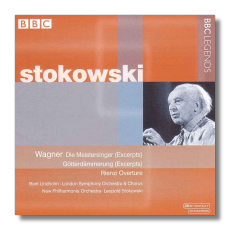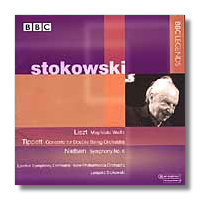
The Internet's Premier Classical Music Source
Related Links
- Latest Reviews
- More Reviews
-
By Composer
-
Collections
DVD & Blu-ray
Books
Concert Reviews
Articles/Interviews
Software
Audio
Search Amazon
Recommended Links
Site News
 CD Review
CD Review
Stokowski Conducts

Richard Wagner
- Excerpts from "Die Meistersinger von Nürnberg"
- Excerpts from 'Götterdämmerung'
- Overture 'Rienzi'
Berit Lindholm, soprano
London Symphony Chorus and Orchestra/Leopold Stokowski
New Philharmonia Orchestra/Leopold Stokowski
23 September 1967 (Meistersinger)
15 June 1967 (Götterdämmerung)
18 June 1968 (Rienzi)
BBC Legends BBCL4088-2 74m ADD


- Giovanni Gabrieli: Sonata pian e forte
- Michael Tippett: Concerto for Double String Orchestra
- Franz Liszt: Mephisto Waltz #1
- Carl Nielsen: Symphony #6 "Sinfonia semplice" *
London Symphony Orchestra/Leopold Stokowski (1963)
* New Philharmonia Orchestra/Leopold Stokowski (1964)
BBC Legends BBCL4059-2 ADD monaural 72:40
The BBC has releasing broadcast material from its vaults and we are all richer for it. There are three other discs featuring Stokowski and I will touch on those at the end.
I have to be honest and say that the Wagner release is a disappointment. There are some fascinating things in here, but the sound is thin, the Stokowski bass effect is there but undermined by the acoustics. In the Entry of the Masters the chorus joins in the final minutes. I was frankly stunned by the impact this made on the music. It was thrilling. The chorus was already on hand for the Beethoven 9th which was on the second part of the program and so Stokowski decided to throw them in as a bonus. I could do without Lindolm's contributions… at first I couldn't believe she was a soprano because her voice is SO low. The Rienzi is in stereo and the sound is a bit better. I am glad to have this disc in the Leopold Stokowski Society of America's archive, but it is really not representative of The Stokowski Sound and there are better commercial recordings of some of the music.
Now the next disc should be in the collection of every serious lover of classical music and not just Stokowski fans. The sound is monaural but is very good and represents the Maestro's "sound". The Gabrielli offers Stokowski's arrangement for winds and brass. Stokowski had previously recorded this piece in an arrangement entirely for brass for United Artists in an arrangement by Fritz Stein. In this performance the entire opening is on the woodwinds and the brass doesn't come in until the piece is well underway. * If you have heard the earlier recording this one is better. I had not heard anything by Tippett before this disc arrived and I was really pleased with the music. The excellent notes by Michael Jameson quotes D.H. of the Evening Dispatch, "Here the composer, present, bowed his delight from the platform, as well he might for he'll possibly never hear his fine work better played." I can only say that the Mephisto Waltz had me on the edge of the chair and I damn near jumped up to applaud at the close. I had heard the Nielson some years ago on a tape made for me from someone who had a radio copy he'd made. Needless to say the sound is much better here. To paraphrase from the notes Stokowski brought to the music a "visionary pathos". It is, to my ears, better than any studio recording I know and that includes Bloomstedt's fantastic London/Decca recording. This disc offers a fantastic evening's listening experience and is strongly recommended.
Other releases in this series will be covered in more detail in the 2002 CDiscography to be updated later this year. They include:
4005: Britten's Young Person's Guide to the Orchestra and Beethoven's 7th Symphony from July 1963. In both it seems like Stokowski gets off to a slow start but by the end the tension is screwed tight. At the close of the Britten the audience is on its feet. Some critics, like in the Penguin Guide to Compact Discs have complained that "Stokowski… mutilates the Scherzo by eliminating the second reprise of the Trio and the third repeat of the Scherzo proper." I don't find them objectionable and even those Nay Sayers admit the performance has "great power" and is "breathtaking". I would second those opinions. The disc concludes with a dynamic, erotic El amor brujo with Gloria Lane as soloist. This 1964 performance is by far the best Stokowski I know of the piece and that includes his studio one for Columbia. All of these performances are with the BBC Symphony Orchestra. I am pretty sure this is all in stereo, the sound is very good, but there is no indication on the disc or its cover.
4018: The items on this release are all from a performance with the New Philharmonia in June of 1968. Alexander Scriabin's Le Poeme de l'extase was a favorite of Stokowski, he recorded it during his tenure in Philadelphia. This performance wrings every ounce of emotion from the score; it is orgasmic. This is followed by a Symphonie Fantastique, which is far more exciting than the studio performance made with the same orchestra a year later. The rubato and portamento emphasize the Symphonie's Fantastique, grotesque side, the bells in the final movement are eerie as hell (pun intended). Then there is a typical Stokowski interview with Deryck Cooke where Stokowski seems to be playing with the interviewer instead of allowing himself to be really interviewed.
4069: Another complete concert, this time with the Royal Philharmonic in June of 1969. This is another disc that will provide a wonderful evening of listening. It opens with Mussorgsky's "Night on the Bare Mountain" arranged by Stokowski. Then follows: Glinka's Kamarinskaya; Shostakovich's Prélude in e flat minor (arr. Stokowski) Stravinsky's Pastorale (also arr. Stokowski) Tchaikovsky's 1812 Overture; yet another Scriabin Poeme de l'extase; Lyadov's Eight Russian Folk Songs and concludes with Borodin's Polovtsian Dance. The stereo sound is very good.
Editorial: I will now take a moment to express my one complaint with all of the releases in this series (and that includes a Monteux disc I have, so I assume they are all like this) the inclusion of applause at the end of each piece. I don't go to concerts. If I wanted to hear applause I would go to concerts. It would take no trouble to edit them out and I wish they would. I am probably in a minority here, but I have to put in my two bits.
* Much thanks to Stokowski expert Ed Johnson for this technical information.
Copyright © 2002, Robert Stumpf II


















